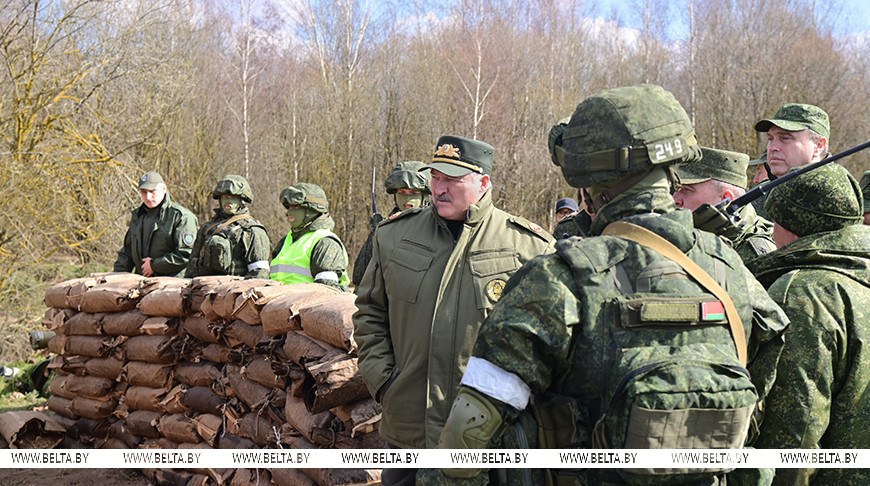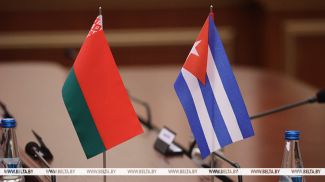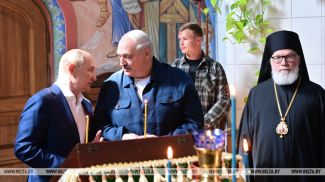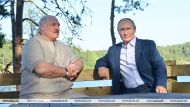
The work schedule of the Belarus president is always full of events. Aleksandr Lukashenko holds conferences and working meetings on the most topical matters concerning the country’s development, regularly visits the regions, goes on foreign trips and welcomes foreign guests, talks to reporters, signs decrees and laws. And even if there are no public events, it does not mean that the head of state does not work. It must be said that even when he relaxes, for instance, by playing ice hockey or chopping firewood, Aleksandr Lukashenko happens to find the time to give yet another instruction. All the decisions must be prompted by life, he likes to say.
The President’s Week project is intended for those, who want to keep up with the head of state, be up-to-date on the latest statements and decisions of the Belarusian leader.
The president’s working trip to Oshmyany District where the army was carrying out a combat readiness check in a swathe of land was the central event of the week. Although army affairs topped the agenda, the conversation also touched upon other matters of current interest. While talking to reporters, Aleksandr Lukashenko mentioned how security agencies interacted right after the terrorist attack outside Moscow on 22 March and the relevant contacts with Vladimir Putin. Ways to ensure security were also mentioned.
By the way, Aleksandr Lukashenko noted that matters of defense and security will be the most important items on the agenda of the Belarusian People’s Congress session in April. The session is expected to begin with the president’s brief report on the situation in the world, on the country’s economy, and existing challenges and threats. The final agenda and the procedure of the session are still being worked out.
Aleksandr Lukashenko also shared personal worries concerning the Belarusian cosmonaut Marina Vasilevskaya’s flight to the International Space Station, after which Belarus can be rightfully considered a space power. “We are gradually replacing ‘bast shoes’ with normal footwear. I don’t want you to be called underdeveloped after my time. No. We are a space power and we have accomplished it by pursuing the right policy. Sorry for putting myself forward. We did not fight with Russians. We learned a lot from them!” the head of state said.
Agricultural affairs are traditionally mentioned during trips to the regions. The president drew attention to matters concerning the quality of land amelioration and sowing operations. Aleksandr Lukashenko described the current weather conditions and the state of the crops after winter as ideal. But Grodno Oblast authorities were also reprimanded for sowing crops without removing large stones from the fields first. “Disgusting work. Why did you have to sow winter crops on top of stones? How are you going to harvest crops? I didn’t expect such a mess in Grodno Oblast,” the president said.
Key details of the presidential schedule are covered by the latest episode of BelTA’s special project President’s Week.
PLENTY OF RESERVES. What potential for cooperation with Omsk Oblast does Aleksandr Lukashenko see?
The head of state started the work week by meeting with Governor of Russia’s Omsk Oblast Vitaly Khotsenko. The president started the conversation by talking about various recent events in Russia. On the one hand, heads of the regions have contributed a lot to the successful organization of the presidential election. On the other hand, a monstrous terrorist attack happened outside Moscow.
“As time shows, we cannot relax under any circumstances. There will be relentless attempts to pressure and destabilize us, bring us to our knees. We discussed this with President Putin even before the presidential election. They will not leave us alone, and we will see more stories that will be increasingly confusing and complex, unfortunately, as the recent events in Moscow Oblast have shown,” Aleksandr Lukashenko noted. “President Putin and I were in touch day and night. We worked very closely. You know the outcomes. This is exactly the way how the two presidents and special services are supposed to work in the Union State.”
The president noted that in this difficult time oblast governors also bear a special burden of responsibility, including in efforts to ensure security.
Growth points
The annual bilateral trade between Belarus and Omsk Oblast makes up at least $110 million. “It is a rather small figure, and we should increase it considerably. There are plenty of reserves to do this,” Aleksandr Lukashenko noted.
Speaking about specific points of growth in trade and economic interaction, first of all Aleksandr Lukashenko focused on Belarus’ capabilities for cooperation in agriculture. Omsk Oblast has recently secured considerable accomplishments in agriculture and is now among the leading regions in the Siberian Federal District in terms of agricultural output. The region is also one of Russia’s top linen flax producers. “It is God’s will that we should cooperate in this area. Because, as you know, Belarus pays great attention to this area,” the president said.
He assured that Belarus has the capability to satisfy Omsk Oblast’s demand for modern and reliable machines and equipment.
Science is an important and promising avenue of cooperation.
“I am convinced that our scientists have something to work on. The key thing is making sure that research is not done just for the sake of research. The economy should get an effect from scientific activities every year,” the head of state said. By the way, the National Academy of Sciences of Belarus and the Omsk Agrarian Scientific Center are already cooperating.

Import substitution has always been on the agenda of negotiations between the two countries and between regions lately. Cooperation with Omsk Oblast has already resulted in a joint product that is unique for the post-Soviet space. The Omsk Research Institute of Instrument Engineering has developed an automated system for managing livestock farms ASU-AGRO. OAO Gomelagrokomplekt is currently working to deploy such a system using Belarusian equipment. Fifteen units of milking equipment have already been delivered to Russia.
Another example of successful investment cooperation is Omsk Carbon Mogilev, a joint project that is being implemented in Mogilev. The enterprise was initially supposed to sell products to Western Europe, but after the imposed sanctions it managed to promptly redirect its sales to the Asian region. The enterprise sells its products to more than 15 countries.
“I hope there will be more and more such examples of investment cooperation between Belarus and your region,” the president said.
In addition to new breakthrough avenues of cooperation there are quite many traditional Belarusian products Omsk Oblast is interested in. For instance, elevators, municipal vehicles, and road construction and maintenance machines.
Omsk Oblast is also interested in inviting Belarusian construction workers to build many large-scale facilities in the region.
Cooperation in culture, education, sport, joint efforts to preserve historical truth and memory about the Great Patriotic War occupy a special place on the bilateral agenda.
A trading house and direct air service
In turn, the Omsk Oblast governor mentioned a project designed to create a multibrand center for all the Belarusian machines, vehicles, and equipment in Omsk. An investor, who is ready to implement the project, is already available.
In addition, the possibility of opening a Belarusian trading house in Omsk to sell a wide range of products, including textiles and agribusiness products, is also being discussed. “We have selected the best land plots in the city center. We have chosen the premises. Therefore, if you give the go-ahead, we would like to open a Belarusian trading house in Omsk Oblast,” noted Vitaly Khotsenko.

He pointed out that Omsk is very conveniently located from the point of view of logistics. It is relatively close to Tyumen, Novosibirsk, and Kazakhstan. “Belarusian goods can occupy a large niche,” the head of the Russian region is convinced.
Belarus is traditionally one of Omsk Oblast’s top five trade partners in terms of trade turnover. In 2023 Belarus became the fourth largest trade and economic partner by getting ahead of Kyrgyzstan. “We see that the potential of trade turnover can be further increased. It is over $110 million today. We believe that it can be doubled or tripled within the next five years,” Vitaly Khotsenko said.
The governor noted that the possibility of organizing direct air service between Minsk and Omsk starting 2025 had also been discussed during the meeting with the Belarusian head of state. The air carrier able to offer this service is now being sought. “We will try to organize this flight,” he said.
NO QUARTER. What will happen to border trespassers and who plays the key role in a war?
On 26 March Aleksandr Lukashenko went on a working trip to Oshmyany District, Grodno Oblast. The region borders on Lithuania where the NATO military contingent grows larger every year. For instance, three battalions are deployed in the military training area Pabrade 15km away from the state border: an infantry battalion, a mechanized battalion of Germany and a tank battalion of the USA.

Such challenges to military security exist not only in the direction of Lithuania. They can also be found on the side of Poland and Latvia. The situation along the Belarusian-Ukrainian border is tense as well. Belligerent rhetoric of neighboring countries and obvious provocations force Belarus to keep its powder dry, to train and educate its army.
The Belarusian army keeps doing it all the time, including by organizing combat readiness checks. But staging an army exercise in a military training area where everything is familiar is one thing. Operating in an unknown swathe of real terrain is another. An area was chosen in Oshmyany District, which is close to the state border. Army units left their permanent stations and redeployed to this location promptly. They occupied positions, dug up trenches, and set up roadblocks. They also reinforced border security, arranged patrols, organized aerial reconnaissance using drones, and took many other steps including taking care of daily needs of military personnel in field conditions. Aleksandr Lukashenko went to see how all of it works out in practice not only as the president but also as the commander-in-chief.
While talking to reporters, the president said: “Belarus is the world’s most peace-loving country. There is no need to rebuke us by saying we are going to fight against them [the West]. No one in Russia is going to fight against NATO just the same. But if they try something in this direction, the answer will be instantaneous. We will rise up like Brest Fortress.”

A tough response to possible provocations
The head of state was informed about the situation in the northwestern sector of operations. The situation remains complicated due to the construction of engineering structures in the form of antitank trenches, firing positions near the Belarusian border and due to the concentration of material supplies and ammunition in warehouses. The situation is exacerbated by the presence of impressive military contingents from various NATO countries near the border.
Apart from that, reconnaissance flights against Belarus are organized regularly. The military exercise Quadriga 2024 is currently underway in a number of countries, including Lithuania and Poland. At present 132 combat aircraft of the NATO air force group are based in the area adjoining Belarus’ northwestern border. The battalions stationed at the military training area Pabrade may be used to carry out provocative actions near the border using sabotage and reconnaissance groups and illegal armed units.
“I will say this publicly: any provocation must be suppressed by force of arms. No joking around. Those who violate the state border must be destroyed. Don’t treat them with kid gloves. That’s how we will do it. Because you know what will happen if we dawdle. Therefore, those who violate the state border must be destroyed. They understand only force,” Aleksandr Lukashenko said.
“Do they seriously think that we and Russians are trying to attack them or will attack them? They are digging antitank ditches for some reason… After all, we’re not going to go there,” the head of state noted.
The president stressed that one cannot relax in this situation: “We are convinced that they will attack us if we lower our guard. I am absolutely sure about it.”
The role of soldiers and conventional weapons in modern warfare
According to the head of state, the development of the army should focus on peculiarities of modern warfare. For instance, Belarus has a lot of forests and swamps. This is why in addition to cutting-edge high-precision weapons the army also needs conventional weapons and skillful actions of military personnel in the field. “Don’t forget that ordinary soldiers, conventional weapons accomplish the key mission in any war. Plus reinforcements. The war in Ukraine demonstrates that unmanned aerial vehicles are very effective: recon and strike drones,” the president said.
Electronic warfare solutions are also important, including for fighting drones. “It is a novelty one cannot do without,” the Belarusian leader stressed.
Apart from that, counterbattery fire is important. Artillery has always been considered the god of war. Artillery still has a significant role to play.
In other words, modern warfare needs everything: mines, assault rifles, machine guns, grenade launchers, tanks, and armored personnel carriers. Belarus took timely measures to ensure composure and repair the relevant arsenal.

At the same time the country has modern air defense systems among other things but Aleksandr Lukashenko is not inclined to overexaggerate their significance: “Whatever an S-400 may be, although it is a very sophisticated air defense system, no war can be fought today without conventional weapons and soldiers, without officers and commanders”.
The president also drew attention to military training. One of the key tasks is to train reservist officers. If a war breaks out, they will in charge of commanding the rank and file.
He recalled the thesis that you have to prepare for war in order to prevent war. “I see that our army has changed over the last two years and it continues changing,” Aleksandr Lukashenko said.
Total craziness of Western provocateurs
Aleksandr Lukashenko commented on mass media infrequent reports about Russia’s and Belarus’ plans to attack the West. “Complete nonsense,” the head of state described them in no uncertain terms.
The president once again assured that such a move would be detrimental to Russia’s and Belarus’ interests since “may God give us a chance to deal with things in Ukraine.” “What war against NATO troops are they talking about? We do not need it! They are waiting for it. They are provoking us to respond somehow. Take the recent sending of sabotage groups across the Ukrainian border through Belarus. Why are they doing it? We do not attack. We do nothing. They are provoking us to respond. They are interested in unleashing this war,” Aleksandr Lukashenko said.
He pointed out that those, who are interested in a military conflict in this region are located in the West and want to accomplish everything by proxy in order to benefit from it later on: “Then they will come here, to the smoldering ruins, print dollars and restore these lands, but not in the interests of our peoples. Neither Lithuanian, nor Polish, nor Belarusian ones.”

The head of state also made a few comments about the presence of foreign troops in neighboring Lithuania. “Do you think that Germans and Americans have come here to defend Lithuania in case of a clash with Belarusians and Russians? Such things have never happened before. They are not going to do that! At the first serious situation they will run away from the battlefield! And it will be the right thing to do! Their land is in Germany and the United States of America. No mercenaries will solve any issue here,” the Belarusian leader is convinced.
He spoke in the same manner about the potential deployment of French or NATO troops in Ukraine. “It would be beneficial for us. They would not defend Ukraine the way Ukrainians defend it now,” Aleksandr Lukashenko said.
“We are not going to fight them. We do not need it. I have always said: we do not need what is not ours, but we will never give away what belongs to us. That’s it. This is our logic. We don’t need this war,” the Belarusian leader stressed.

OVERRIDING PRIORITY. What should funding be used for and is the central bank’s performance satisfactory?
On 28 March Aleksandr Lukashenko heard out a report about the operation of the banking system and the measures being taken to facilitate foreign trade operations. Chairman of the Board of the National Bank of the Republic of Belarus (NBRB) Pavel Kallaur, First Deputy Prime Minister Nikolai Snopkov, Deputy Head of the Belarus President Administration Aleksandr Yegorov, Finance Minister Yuri Seliverstov, and Deputy Minister of Foreign Affairs Igor Nazaruk took part in the meeting. The head of state noted they are the key people, who take care of economy and finance in Belarus.
The president suggested first of all discussing the existing problems honestly and openly but identified the key priorities right away: The economy is an overriding priority. Any financial activity should serve interests of the economy. Whatever it may cost us. This is the key thing. Otherwise, why would we need such a financial system?”
Oversight over the operation of the National Bank
The head of state noted that oversight over the operation of the central bank would be stepped up. Previously made personnel decisions serve this purpose among other things. “When I appointed [Aleksandr Yegorov] Deputy Head of the Belarus President Administration, I said that this person is well versed in finance and banking. And it will be easier for the Belarus President Administration to talk to the National Bank and its specialists because we will be on the same page. We studied at the same universities. We also want the State Control Committee to join in,” said Aleksandr Lukashenko.
“As you understand, Pavel Vladimirovich [Kallaur, Chairman of the Board of the National Bank], the National Bank cannot be beyond control. Control is exercised by the president, and you may have noticed that this control will be stepped up due to the appointment of new people in the financial and economic bloc,” the president added.
At the same time, Aleksandr Lukashenko emphasized that it does not mean that they were going to interfere with the work of the National Bank. “It fulfills its functions, by and large,” he said.
Operation amid Western sanctions
Results achieved by the economy over the past year demonstrate that the economy is coping with the complicated situation arising from the pressure of unfriendly Western countries on Belarus. “Which means that the government and the National Bank are coping as well. But it does not mean that there are no problems in this respect,” the Belarusian leader noted.
The head of state mentioned the need to assist commercial entities with making settlements with foreign partners: “We can set aside sanctions. We seem to be coping with sanctions. Everything seems to be okay. But, as Russia has also admitted, we feel the pressure primarily from the United States. Pressure relating to business transactions. I have said many times to you and the government that we need to help economic entities. Wherever we can.”

Aleksandr Lukashenko stressed that it should be done calmly, without noise and shouting.
Price controls
One of the essential matters Aleksandr Lukashenko drew attention to included control over the pricing system in the country. The president reminded to those present at the meeting that both the National Bank and the government were responsible for taking care of inflation and for taming prices in Belarus.
“On my instruction the government has taken certain measures to take control of the pricing system in the country,” Aleksandr Lukashenko said. “I see that we are managing to regulate prices and restrain them to a certain extent.”
“We are not going to abandon this practice. Price controls will be even strengthened,” the head of state emphasized. “This task has been set for the government. I would like the National Bank to keep it in mind as well and to do everything necessary to ensure that our people have no complaints about rising prices and inflation in the country.”
The president pointed out that the government is not going to interfere and introduce price caps where it is not necessary, or, on the contrary, to watch unreasonable price growth without taking appropriate measures.
“We would like to develop a streamlined price regulation system,” Aleksandr Lukashenko explained. “Some may like it or not, but I have made the decision and it needs to be implemented.”











